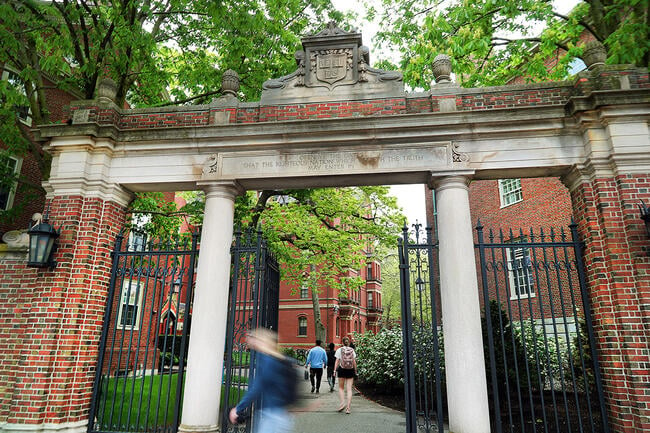You have /5 articles left.
Sign up for a free account or log in.

The Department of Homeland Security on Thursday announced it had stripped Harvard of its ability to enroll international students, who make up more than a quarter of Harvard’s enrollment.
John Tlumacki/The Boston Globe/Getty Images
Amid an ongoing legal showdown with Harvard University, the Trump administration has carried through on a recent threat to halt the private institution’s ability to host international students.
The move was first reported Thursday afternoon by The New York Times, then subsequently announced on social media by Secretary of Homeland Security Kristi Noem.
“This administration is holding Harvard accountable for fostering violence, antisemitism, and coordinating with the Chinese Communist Party on its campus. It is a privilege, not a right, for universities to enroll foreign students and benefit from their higher tuition payments to help pad their multibillion-dollar endowments,” Noem wrote in the announcement. “Harvard had plenty of opportunity to do the right thing. It refused.”
(Though much of the federal government’s recent focus on Harvard has concerned the university’s alleged failure to address antisemitism on campus, the Trump administration has also raised questions about collaboration with foreign researchers, particularly those with ties to the Chinese and Iranian governments.)
In her statement, Noem wrote that Harvard’s Student Exchange and Visitor Program certification was being stripped “as a result of their failure to adhere to the law,” which she said should “serve as a warning to all universities” across the U.S.
Current international students would be required to transfer to maintain their visa status.
Noem added that Harvard would need to turn over demanded records within 72 hours if it would “like the opportunity of regaining” SEVP certification “before the upcoming school year.”
A Harvard spokesperson called the action “unlawful” in an emailed statement.
“We are fully committed to maintaining Harvard’s ability to host international students and scholars, who hail from more than 140 countries and enrich the University—and this nation—immeasurably,” the spokesperson wrote. “This retaliatory action threatens serious harm to the Harvard community and our country, and undermines Harvard’s academic and research mission.”
Impact on Harvard
Harvard enrolled 6,793 international students last fall, according to university data. International students have made up about a quarter of Harvard’s head count over the last decade—a population that could disappear, along with their substantial tuition dollars, if the Trump administration's directive holds.
Noem threatened to revoke Harvard’s SEVP certification last month after the university pushed back on federal government demands to turn over “detailed records on Harvard’s foreign student visa holders’ illegal and violent activities by April 30.” That threat followed Harvard’s refusal to acquiesce to sweeping demands to overhaul its governance, admissions and hiring processes and more in response to allegations of antisemitic conduct. The university then sued the Trump administration over a federal funding freeze and other recent actions.
Revoking Harvard’s SEVP certification is the second punch the government threw at the university this week, coming after the Department of Health and Human Services announced the termination of $60 million in multiyear federal grants, which officials attributed to concerns about campus antisemitism.
Other sources of federal funding are on hold. Altogether, the Trump administration has frozen at least $2.7 billion flowing to the private university, or about a third of Harvard’s federal funds.
A New Political Cudgel
The Student Exchange and Visitor Program’s process for revoking universities’ SEVIS status is usually a prolonged and complicated bureaucratic affair, typically preceded by a thorough investigation of the institution and the possibility of appeal.
Sarah Spreitzer, vice president and chief of staff for government relations at the American Council on Education, told Inside Higher Ed that the manner in which the federal government stripped Harvard’s SEVP certification was unprecedented.
“In a normal world, Harvard is supposed to actually get a notice that their SEVIS certification is being revoked, and then there is an appeals process,” Spreitzer said. “It doesn’t seem that DHS is following any of the regular requirements that are included in statute for taking this action.”
In late March, Trump officials first proposed revoking SEVP status from institutions that they believed fostered antisemitism on campus, aiming their threats specifically at Columbia and the University of California, Los Angeles, which were home to major pro-Palestinian protests in 2024. In mid-April they threatened Harvard with decertification.
Clay Harmon, director of AIRC: The Association of International Enrollment Management, told Inside Higher Ed in March that historically, SEVP investigations are conducted when universities are suspected of delivering less-than-bona-fide degree programs, using shady coursework as a way to essentially sell student visas to would-be immigrants who want a fast way to enter the country.
“It is the government’s primary way of ensuring that international student visas are not granted for diploma mills, fake institutions or institutions that are not adequately financially supported,” Harmon said. “I’ve never heard of a fully accredited, reputable institution—whether it's Columbia or Bunker Hill Community College—being subjected to some kind of extraordinary SEVP investigation outside of the standard recertification process.”
The initial process of certification, Harmon added, is intensive and can take institutions months or even longer to complete, which is one reason why decertification is so rare. Wielding the organization’s oversight powers as a tool for leverage in a larger political battle, he said, would be “a significant departure from past practices and established precedents.”
“It is clear that the administration is putting forward new interpretations of laws and powers that have not been established through case law or regular practice,” Harmon said.
In an email to Inside Higher Ed on Thursday, Harmon said the administration’s decision to use decertification against Harvard “imposes real, immediate, and significant harm on thousands of students for reasons outside their control and unrelated to their own actions.”
“This action may have broad and long-term negative impacts—well beyond Harvard and well beyond 2025—to the educational experience and financial health of U.S. institutions,” he wrote.
Revocation of Harvard’s SEVP certification prompted sharp reactions online.
Aaron Reichlin-Melnick, a senior fellow at the American Immigration Council, wrote on social media that Noem’s actions are “likely illegal” and her letter showed no evidence of Harvard’s violations.
“Nothing in here alleges ANY specific violation of the Student and Exchange Visitor Program. Nothing. She cites no law violated, no regulation broken, no policy ignored,” Reichlin-Melnick wrote. “I don’t care what you think of Harvard; this is clear weaponization of government.”
Will Creeley, legal director of the Foundation for Individual Rights and Expression, called the government’s revocation of Harvard’s ability to host international students “retaliatory and unlawful.”
In a statement posted on X, he assailed the Education Department’s demands that Harvard hand over footage of international students protesting on campus.
“This sweeping fishing expedition reaches protected expression and must be flatly rejected,” Creeley wrote. “The administration’s demand for a surveillance state at Harvard is anathema to American freedom … This has to stop.”
But some officials in the MAGA camp celebrated the move.
“This is a remarkable first step,” Republican senator Ashley Moody of Florida wrote on X. “I applaud the administration for taking a stand to rid our universities of malign foreign influence.”





